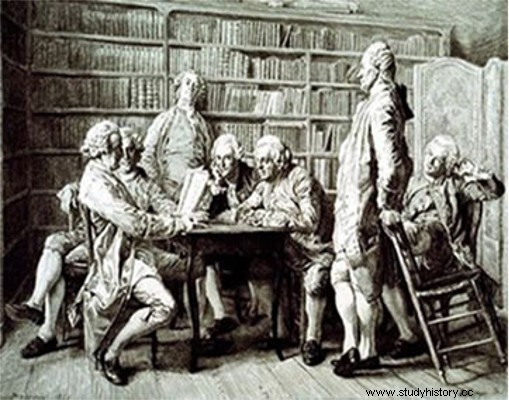
By Lilian Aguiar
The Illuminist movement took place between 1680 and 1780, throughout Europe, especially in France, in the 18th century. The Enlightenment was characterized by the importance given to reason. With that, reason would lead man to wisdom and lead him to truth. The greatest expression of the manifestation happened with the French Enlightenment, from then on it spread throughout the western world. We note that in this period France was tormented by the contradictions of the old regime and, mainly, by the yoke of a lengthy land system, with a sharp character, which eventually generated dissatisfaction in the various sectors of society, especially among the bourgeoisie and small peasants.
The French Enlightenment Theory had the support of great intellectuals of the time, such as Voltaire (1694-1778). Voltaire assumed an extremely critical tone of the Enlightenment ideology, competent writer and combative intellectual, he fiercely criticized the privileges of the nobility and the clergy, despite believing in God. His positions led him into exile in England, where he came into contact with the ideas of John Locke and Isaac Newton . The Enlightenment preached freedom of expression and equal rights, fought against absolutist oppression, but recognized in his political reflections that certain countries, the most backward, should be governed by centralizing monarchs accompanied by Enlightenment thinkers; it was enlightened despotism taking shape. Despite taking positions in favor of freedom and equal rights, Voltaire did not look favorably on the poorest population, despising them completely.
One of the rare thinkers of noble tradition who embraced Enlightenment ideas was Montesquieu (1689-1755). In his greatest work, The Spirit of Laws , he defended the view of power in three spheres, the Executive, the Legislative and the Judiciary. Each of them should at the same time be independent and supervise the others. The French aristocrat, opposed to revolutions, proposed a system of government with an Executive power limited by Parliament, whose members would be recruited from among landowners and educated people in society. He believed that aristocratic honor required parliaments to serve the community.
One of the most outstanding and original Enlightenment thinkers was Jean Jacques Rousseau (1712-1778). Unlike most Enlightenmentists, he was not a staunch supporter of rationalism. His main works were The Discourse on the Origin and Foundations of Inequality Among Men and The Social Contract . In the first book he argued that man, in his most natural essence, was good, so nature made man happy and good, but society depraved him, making him miserable. The origin of human unhappiness and social differences would be in the emergence of private land ownership. In The Social Contract he defended the concept that democracy was based on the will of the majority, that is, on the sovereignty of the people, which was manifested by the vote. Elected governments, therefore, should reflect and follow this general will. He advocated popular sovereignty.
It is important to emphasize how French Enlightenment ideas influenced modern political institutions. To this day, with minor modifications, most countries retain Enlightenment characteristics.
